<Back to Index>
- Composer Charles Peter Wuorinen, 1938
- Composer Brian John Peter Ferneyhough, 1943
- Composer Michael Laurence Nyman, 1944
PAGE SPONSOR
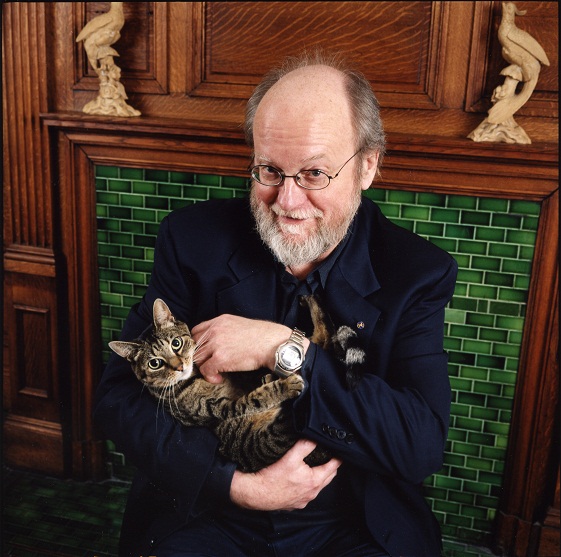

Charles Peter Wuorinen (June 9, 1938 - March 11, 2020) was a prolific Pulitzer Prize winning American composer born and living in New York City. His catalog of more than 260 compositions includes works for orchestra, opera, and chamber music, as well as solo instrumental and vocal works. In recent years he has dedicated attention to large scale works for the stage, including collaborations with Salman Rushdie and Annie Proulx.
Wuorinen was born on the Upper West Side of Manhattan in New York City. His father, John H. Wuorinen, was chairman of the history department at Columbia University and a noted scholar of Scandinavian affairs who also worked for the Office of Strategic Services and was the author of five books on his native Finland. His mother, Alfhild Kalijarvi, received her M.A. in biology from Smith College. Wuorinen excelled academically, graduating from Trinity School (New York City) as valedictorian in 1956; he later received his B.A. (1961) and M.A. (1963) in music from Columbia University. Early supporters included Jacques Barzun and Edgard Varèse. He lived in New York City and Long Valley, New Jersey. Wuorinen was married to his longtime partner and manager Howard Stokar.
Wuorinen began composing at age 5 and began piano lessons at 6. At sixteen he was awarded the New York Philharmonic's Young Composers' Award and the John Harms Chorus premiered his choral work O Filii et Filiae at Town Hall (2 May 1954). He was active as a singer and pianist with the choruses at the Church of the Heavenly Rest and the Church of the Transfiguration (Little Church Around The Corner), and was the rehearsal pianist for the world premiere production of Carlos Chavez's opera Panfilio and Lauretta at Columbia University during the spring of 1957. From 1952 to 1956 Wuorinen was President of the Trinity School Glee Club. He was pianist, librarian and General Manager of the Columbia University Orchestra (1956 - 57). During the summers of 1955 and 1956 has was the organist at Saint Paul's Church in Gardner, Massachusetts, where his parents stayed during the summer months. He was awarded the Bearns Prize (3 times), the BMI Student Composers Award (4 times) and the Lili Boulanger Award. He was a fellow at the Bennington Composers Conference for several years. Many early professional performances of Wuorinen's compositions took place on the Music of Our Time series at the 92nd Street Y run by violinist Max Pollikoff.
In 1962 Wuorinen and fellow composer - performer Harvey Sollberger formed The Group for Contemporary Music. The ensemble raised the standard of new music performance in New York, and championed the music of such composers as Milton Babbitt, Elliott Carter and Stefan Wolpe, who wrote several works for the ensemble. Many of Wuorinen's works were premiered by The Group, including Chamber Concerto for Cello and the Chamber Concerto for Flute. Major Wuorinen compositions of the '60s include Orchestral and Electronic Exchanges, premiered by the New York Philharmonic conducted by Lukas Foss, the First Piano Concerto, with composer as soloist, the String Trio, written for the then newly formed new music ensemble Speculum Musicae, and Time's Encomium, Wuorinen's only purely electronic piece, composed using the RCA Synthesizer at the Columbia - Princeton Electronic Music Center under a commission from Nonesuch Records, for which Wuorinen was awarded the 1970 Pulitzer Prize for Music at the age of 32. Wuorinen was appointed to an instructorship at Columbia in 1964 and promoted to assistant professor in 1969; during this period, he held visiting lectureships or residencies at the New England Conservatory (1968 - 71), Princeton University (1969 - 71), the University of Iowa (1970) and the University of South Florida (1971).
The 1970s were a particularly fruitful period for Wuorinen, who taught from 1971 to 1979 at the Manhattan School of Music. Chamber works during this decade include his first two string quartets, the Six Pieces for Violin and Piano, Fast Fantasy for cello and piano and two large works for the Tashi ensemble, Tashi and Fortune. Works for orchestra include the Grand Bamboula for strings, A Reliquary for Igor Stravinsky which incorporates the elder master's last sketches, the Second Piano Concerto and the Concerto for Amplified Violin and Orchestra, which caused a scandal at its premiere at the Tanglewood Festival with Paul Zukofsky and the BSO conducted by Michael Tilson Thomas. In 1976 Wuorinen completed his Percussion Symphony, a five - movement work for 24 players including two pianos for the New Jersey Percussion Ensemble and his longtime colleague Raymond DesRoches, as well as his opera subtitled "a baroque burlesque", The W. of Babylon with an original libretto by Renaud Charles Bruce. In the late 1970s Wuorinen became interested in the work of the mathematician Benoit Mandelbrot and with a grant from the Rockefeller Foundation he conducted sonic experiments at Bell Labs in New Jersey. In an interview with Richard Burbank, Wuorinen is quoted as saying, "What I did at Bell Labs (with Mark Liberman) was to try various experiments in which strings of pseudo - random material, usually pitches but sometimes other things, were generated and then subjected to traditional types of compositional organization, including twelve - tone procedures. What I wanted to do was to see whether or not these things sounded "composed," sounded purposively chosen. They did, at least by my lights. The random sequences were not just any old random sequences but were that of a kind called 1/f randomness."
The 1980s were framed by two large scale works for chorus and orchestra based on Biblical texts, the 60 minute oratorio The Celestial Sphere for the 100th Anniversary of the Handel Oratorio Society in Rock Island Illinois of 1980 and Genesis of 1989 jointly commissioned by the Minnesota Orchestra and San Francisco Symphony. Other major orchestra works during this period include the Rhapsody for Violin and Orchestra, Third Piano Concerto written for pianist Garrick Ohlsson; Movers and Shakers, the first work commissioned by the Cleveland Orchestra for music director Christoph von Dohnányi, Bamboula Squared for computer generated sound and orchestra (inspired by his work at Bell Labs), and The Golden Dance. Wuorinen was composer in residence with the San Francisco Symphony from 1984 to 1989. Major chamber works of the 1980s include his Third String Quartet commissioned to commemorate the 25th anniversary of the Hopkins Center for the Arts at Dartmouth College, The Blue Bamboula for pianist Ursula Oppens, the Sonata for Violin and Piano commissioned the Library of Congress and premiered at the Library on an all - Wuorinen concert, String Sextet, New York Notes, Third Piano Sonata for Alan Feinberg, and trios for various combinations including three works for horn trio. In the 1980s Wuorinen began an association with the New York City Ballet which resulted in a series of works designed for dance, Five (Concerto for Amplified Cello and Orchestra) for choreographer Jean - Pierre Bonnefoux and Wuorinen's longtime colleague and champion Fred Sherry, Delight of the Muses based on works of Mozart and commissioned in honor of the Mozart Bicentennial and three works inspired by scenes from Dante's la Divina Commedia for Peter Martins (The Mission of Virgil, The Great Procession and The River of Light). In addition to the Dante texts Wuorinen was influenced by the watercolors illustrations of William Blake. For New York City Ballet Wuorinen also made a two - piano arrangement of the Schoenberg Orchestra Variations choreographed by Richard Tanner, and Peter Martins created a ballet based on Wuorinen's A Reliquary for Igor Stravinsky. In 1985 Wuorinen was awarded a MacArthur Foundation Fellowship.
Wuorinen devoted increased attention to writing works for the voice, these included his setting of Dylan Thomas's A Winter's Tale for soprano Phyllis Bryn - Julson and the Fenton Songs I & II on poems of the British poet James Fenton with whom Wuorinen was collaborating on an opera. Major chamber works in the 1990s included the Saxophone Quartet for the Raschèr Saxophone Quartet, Percussion Quartet, Piano Quintet, Sonata for Guitar and Piano. Orchestra works included the Concerto for Saxophone Quartet and Orchestra, Symphony Seven as well as the Dante works for the New York City Ballet.
With the start of the 21st century, one of the major champions of Wuorinen's music became James Levine, music director of the Metropolitan Opera and later also of the Boston Symphony Orchestra. Levine commissioned Wuorinen's Fourth Piano Concerto for his first season at the BSO; the tone poem Theologoumenon (a 60th birthday gift for Levine from his longtime manager Ronald Wilford) premiered by the Metropolitan Opera Orchestra; and the Eighth Symphony: Theologoumena, for the BSO. In honor of Wuorinen's 70th birthday Levine conducted two performances of Wuorinen's Ashberyana at the Guggenheim Museum. Other champions of Wuorinen's music include Peter Serkin, for whom Wuorinen composed three concerti including Time Regained (based on music of Machaut, Matteo da Perugia, Guillaume Dufay, and Orlando Gibbons) and Flying to Kahani, commissioned by Carnegie Hall; the solo Scherzo and Adagio; and the Second Piano Quintet with the Brentano Quartet, another ensemble with which Wuorinen has had a very fruitful relationship and for which he wrote his Fourth String Quartet. In 2004 the New York City Opera premiered his opera Haroun and the Sea of Stories based on the novel by Salman Rushdie, with a libretto by James Fenton. Other works from this decade include Cyclops 2000 for Oliver Knussen and the London Sinfonietta; Ashberyana, settings of poetry by John Ashbery; Spin5, a chamber concerto for violinist Jennifer Koh; the Fourth Piano Sonata, for Anne - Marie McDermott; Synaxis; Metagong; and It Happens Like This, a dramatic cantata on seven poems by James Tate premiered at Tanglewood with the composer conducting. In 2012 Wuorinen completed work on an opera begun in 2008 based on Annie Proulx's Brokeback Mountain, with a libretto by Proulx.
Wuorinen is the author of Simple Composition. Wuorinen describes the book as
- written by a composer and ... addressed to other composers — intending or actual, amateur or professional. Thus it is similar in intent to certain older books on the subject like Thomas Morley's A Plain and Easie Introduction to Practical Musicke (1597), for instance.... It outlines present practice, and while it can be used for purely didactic purposes, it can also be employed in composing "real" music.
Wuorinen lectured at universities throughout the United States and abroad, and has served on the faculties of Columbia, Princeton and Yale Universities, the University of Iowa, University of California (San Diego), Manhattan School of Music, New England Conservatory, State University of New York at Buffalo, and Rutgers University. He wrote the introduction to Joan Peyer's To Boulez and Beyond.
Wuorinen was also active as a performer, a pianist and a conductor of his own works as well as other 20th century repertoire. His orchestral appearances have included the Cleveland Orchestra, Chicago Symphony, New York Philharmonic, San Francisco Symphony, Los Angeles Philharmonic, and the American Composers Orchestra. He conducted the American, and later the West Coast, premieres of Morton Feldman's monodrama, Neither.
In 1962 he co-founded The Group for Contemporary Music, an ensemble dedicated to performance of new chamber music. In addition to cultivating a new generation of performers, commissioning and premiering hundreds of new works, the Group has also been a model for similar organizations that have appeared in the United States since its founding.
His works have influenced a number of other composers. Robert Black cited Wuorinen as a particular influence on his own style of composition. Black also recorded Wuorinen's New York Notes.
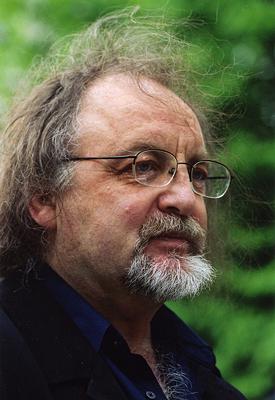
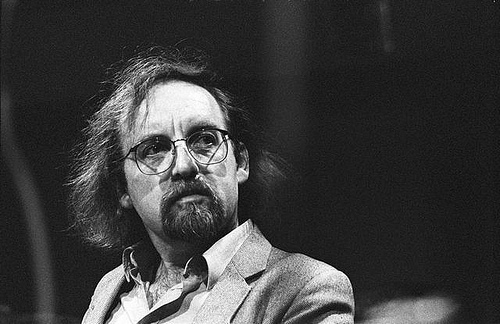
Brian John Peter Ferneyhough (16 January 1943) is an English composer, and one of the central figures of the New Complexity movement in music. His music is characterized by the extensive use of irregular nested rhythmic tuplets and highly complex notation. As a pedagogue of music composition, he held long tenures teaching at the Hochschule für Musik Freiburg, Darmstädter Ferienkurse, the University of California at San Diego, and later Stanford University.
Ferneyhough was born in Coventry and received formal musical training at the Birmingham School of Music and the Royal Academy of Music from 1966 - 67. His teachers there included Lennox Berkeley, a respected teacher though a conservative figure who preferred the works of French impressionism to the internationalist avant garde. Ferneyhough was awarded the Mendelssohn Scholarship in 1968 and moved to mainland Europe to study with Ton de Leeuw in Amsterdam, and later with Klaus Huber in Basel. Between 1973 and 1986 he taught composition at the Hochschule für Musik Freiburg, Germany.
His profile rose in the middle of the 1970s, as the Royan Festival of 1974 saw the premiere of Cassandra's Dream Song, the first of several pieces for solo flute, as well as Missa Brevis, written for 12 singers. In 1975, performances of his work for large ensemble Transit and Time and Motion Study III were given; the former piece being awarded a Koussevitzky prize, the latter performed at the prestigious Donaueschingen festival. In many of these events he was twinned with fellow British composer, Michael Finnissy, whom he became friends with during his student days. In 1984 he was given the title Chevalier de l'Ordre des Arts et des Lettres.
Between 1987 and 1999 he was Professor of Music at the University of California at San Diego. As of 1999, he is William H. Bonsall Professor in Music at Stanford University. For the 2007 - 08 academic year, he was appointed Visiting Professor at the Harvard University Department of Music. Between 1978 and 1994 Ferneyhough was a composition lecturer at the Darmstädter Ferienkurse and, since 1990, has directed an annual mastercourse at the Fondation Royaumont in France.
In 2007, Ferneyhough received the Ernst von Siemens Music Prize for lifetime achievement, which includes a 200,000 Euro cash award. In 2009 he was appointed foreign member of the Royal Swedish Academy of Music.
Ferneyhough's initial forays into composition were met with little sympathy in England. His submission of Coloratura to the Society for the Promotion of New Music (SPNM) in 1966 was returned, with a suggestion that the oboe part should be scored for clarinet. However, whilst Ferneyhough did find it hard, one source of support came from Hans Swarsenski who saw the same thing happen to Cornelius Cardew; Cardew enjoyed a prestigious continental reputation, but a poor one in his homeland. Swarsenski said of Ferneyhough: 'I've taken on an English composer who I think is enormously talented. If this doesn't work, this is the last time'. Ferneyhough continued to struggle, but the aforementioned Royan festival marked a breakthrough for Ferneyhough's career.
From here, Ferneyhough became closely associated with the so-called New Complexity school of composition (indeed, he is often referred to as the "Father of New Complexity"), characterized by its extension of the modernist tendency towards formalization (particularly as in integral serialism). Ferneyhough's actual compositional approach, however, rejects serialism and other "generative" methods of composing; he prefers instead to use systems only to create material and formal constraints, while their realization appears to be more spontaneous.
His scores make huge technical demands on performers; sometimes, as in the case of Unity Capsule for solo flute, creating parts that are so detailed they are likely impossible to realize completely. The compositions have, however, attracted a number of advocates, among them the Arditti Quartet, ELISION Ensemble, the members of the Nieuw Ensemble, Ensemble Contrechamps, Ensemble Exposé, Armand Angster, James Avery, Massimiliano Damerini, Arne DeForce, Friedrich Gauwerky, Nicolas Hodges, Mark Knoop, Geoffrey Morris, Ian Pace, Carl Rosman, Harry Spaarnay, and EXAUDI Vocal Ensemble.
Recently, he started writing works which allude to past composers; his Dum transisset are based on Elizabethan composer Christopher Tye's works for viol. In addition, the fourth string quartet references Schönberg. One of his latest works, an opera, Shadowtime, with a libretto by Charles Bernstein, and based on the life of the German philosopher Walter Benjamin, was premiered in Munich on 25 May 2004, and recorded in 2005 for CD release in 2006. As is usual for Ferneyhough's works, the opera received mixed reviews. In addition, the production was picketed by a group called Militant Esthetix over the treatment of and association with Walter Benjamin, amongst other things.
Ferneyhough used the software packages OpenMusic, PatchWork (PW) and the PatchWork successor PWGL.
Ferneyhough has been called "the most controversial composer of his generation". "In the same year [1974], the performance of several of his works at the Royan Festival established Ferneyhough as one of the most brilliant and controversial figures of a new generation of composers". "Brian Femeyhough may well be one of the most important composers to emerge from the latter half of this century. Simultaneously famous and infamous, he is a controversial figure of world renown, bent on making the most out of music."
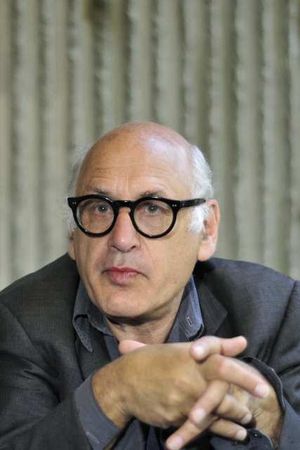
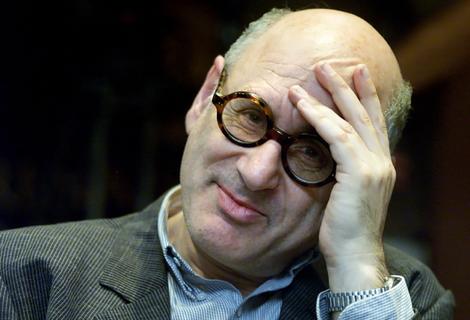
Michael Laurence Nyman, CBE (23 March 1944) is a British composer of minimalist music, pianist, librettist and musicologist, known for the many film scores he wrote during his lengthy collaboration with the filmmaker Peter Greenaway, and his multi - platinum soundtrack album to Jane Campion's The Piano. His operas include The Man Who Mistook His Wife for a Hat, Letters, Riddles and Writs, Noises, Sounds & Sweet Airs, Facing Goya, Man and Boy: Dada, Love Counts, and Sparkie: Cage and Beyond, and he has written six concerti, four string quartets, and many other chamber works, many for his Michael Nyman Band, with and without whom he toured as a performing pianist. Nyman stated that he preferred to write opera rather than other sorts of music.
Nyman was born in Stratford, London. He was educated at the Sir George Monoux Grammar School, Walthamstow. He studied at King's College, London under Alan Bush., and was accepted at the Royal Academy of Music in September, 1961, and studied with Bush and Thurston Dart, focusing on piano and seventeenth - century baroque music. He won the Howard Carr Memorial Prize for composition in July 1964.
In 1969, he provided the libretto of Harrison Birtwistle's opera Down by the Greenwood Side and directed the short film Love Love Love (based on, and identical length to, the Beatles' "All You Need Is Love") before settling into music criticism, where he is generally acknowledged to have been the first to apply the term "minimalism" to music (in a 1968 article in The Spectator magazine about the English composer Cornelius Cardew). He wrote introductions for George Frideric Handel's Concerti Grossi, Op. 6 and conducted the most important interview with George Brecht in 1976.
Nyman drew frequently on early music sources in his scores for Greenaway's films: Henry Purcell in The Draughtsman's Contract and The Cook, the Thief, His Wife & Her Lover (which included Memorial and Miserere Paraphrase), Heinrich Ignaz Franz von Biber in A Zed and Two Noughts, Wolfgang Amadeus Mozart in Drowning by Numbers, and John Dowland in Prospero's Books, largely at the request of the director.
Nyman says he discovered his aesthetic playing the aria, "Madamina, il catalogo è questo" from Mozart's Don Giovanni on his piano in the style of Jerry Lee Lewis, which "dictated the dynamic, articulation and texture of everything I've subsequently done."
He scored numerous films, the majority of them European art films, including several of those directed by Peter Greenaway. His few forays into Hollywood have been Gattaca, Ravenous (with musician Damon Albarn), and The End of the Affair. He wrote settings to various texts by Wolfgang Amadeus Mozart for "Letters, Riddles and Writs", part of Not Mozart. He also produced a soundtrack for the silent film Man with the Movie Camera. Nyman's popularity increased after he wrote the score to Jane Campion's award winning 1993 film The Piano. The album became a classical music best seller. He was nominated for both a British Academy Award and a Golden Globe.
Among Nyman's other works are the opera Noises, Sounds & Sweet Airs (1987), for soprano, alto, tenor and instrumental ensemble (based on Nyman's score for the ballet La Princesse de Milan); Ariel Songs (1990) for soprano and band; MGV (Musique à Grande Vitesse) (1993) for band and orchestra; concertos for saxophone, piano (based on The Piano score), violin, harpsichord, trombone, and saxophone & cello recorded by John Harle and Julian Lloyd Webber; the opera The Man Who Mistook His Wife for a Hat (1986), based on a case study by Oliver Sacks; and four string quartets. In 2000, he produced a new opera on the subject of cloning on a libretto by Victoria Hardie titled Facing Goya, an expansion of their one - act opera Vital Statistics. The lead, a widowed art banker, is written for contralto and the role was first created by Hilary Summers. His later operas are Man and Boy: Dada (2003) and Love Counts (2005), both on libretti by Michael Hastings.
He also composed the music for the children's television series Titch which is based on the books written and illustrated by Pat Hutchins.
Many of Nyman's works were written for his own ensemble, the Michael Nyman Band, a group formed for a 1976 production of Carlo Goldoni's Il Campiello. Originally made up of old instruments such as rebecs and shawms alongside more modern instruments like the saxophone in order to produce as loud a sound as possible without amplification, it later switched to a fully amplified line up of string quartet, three saxophones, trumpet, horn, bass trombone, bass guitar and piano. This line up was variously altered and augmented for some works.
Nyman also published an influential book in 1974 on experimental music called Experimental Music: Cage and Beyond (Catalan, Spanish and French translations), which explored the influence of John Cage on classical composers.
In the 1970s, Nyman was a member of the Portsmouth Sinfonia – the self - described World's Worst Orchestra – playing on their recordings and in their concerts. He was the featured pianist on the orchestra's recording of Bridge Over Troubled Water on the Martin Lewis - produced 20 Classic Rock Classics album on which the Sinfonia gave their unique interpretations of the pop and rock repertoire of the 1950s - 1970s. Nyman created a similar group called Foster's Social Orchestra, which specialized in the work of Stephen Foster. One of their pieces appeared in the film Ravenous and an additional work, not used in the film, appeared on the soundtrack album.
He has also recorded pop music with the Flying Lizards; a version of his Bird List from the soundtrack to Peter Greenaway's The Falls (1980) appears on their album Fourth Wall as "Hands 2 Take."
On 7 July 2007 Nyman performed at Live Earth in Japan. On 2008 Nyman realized, in collaboration with the cultural association Volumina, Sublime, an artist's book that unified his music with his passion for photography.
In a collaboration with friends Max Pugh and Marc Silver, Nyman began to exhibit his films and photography. Nyman’s video works are filmed with a hand - held camera, often before and after concerts and as part of his international travels, featuring everyday moments. Some works are left relatively unedited whilst others undergo split screens and visual repetition. Soundtracks to some of the video works use location sounds, whilst others recycle existing scores from his archive or a combination of both.
In October 2009, Nyman released The Glare, a collaborative collection of songs with David McAlmont, which cast his work in a new light. The album – recorded with the Michael Nyman Band – finds McAlmont putting lyrics based on contemporary news stories to 11 pieces of Nyman music drawn from different phases of his career.
"David did the research and chose most of the musical pieces," Nyman explains. "I suggested a few pieces too but I really didn't do very much, although I think it's a true collaboration. You can identify who was responsible for what, but both aspects create a perfect synergy in which neither element can exist without the other."
Although the album was recorded in just two days, there was a huge amount of preparation and rewriting before they entered the studio. "They're third generation songs and when you listen to them, you ask 'Is it Nyman?' 'Is it soul?' 'Is it rock'n'roll?' It's all and none of them," the composer says. "I think we've created a new musical language. I'm no good at writing pop cliché – when I try, it invariably comes out sounding quite different."
The project has a long gestation for the pair first met in 2004 at a exhibition opening and talked about working together. Nothing came of it for almost five years until they got together again via Facebook, met up for lunch – and the idea for The Glare was born.
"I was surprised and delighted by what we've came up with," Nyman says. "So much so, that when I now play these pieces solo, it sounds like something's missing and the music needs David's voice and approach. That's a remarkable thing, because I've been playing these pieces for years. Of all the many collaborations I've been involved in, none has ever given me more pleasure and I'm desperate to take it on the road and play these."
He was married to Aet Nyman and has two daughters, Molly and Martha. His first string quartet quotes "Unchained Melody" in homage to Aet, who appears in Greenaway's The Falls, for which he also composed music. Molly is a composer in her own right; in collaboration with Harry Escott she has written several film scores including for The Road to Guantanamo by her father's frequent collaborator, Michael Winterbottom. Martha was a development researcher for the BBC.